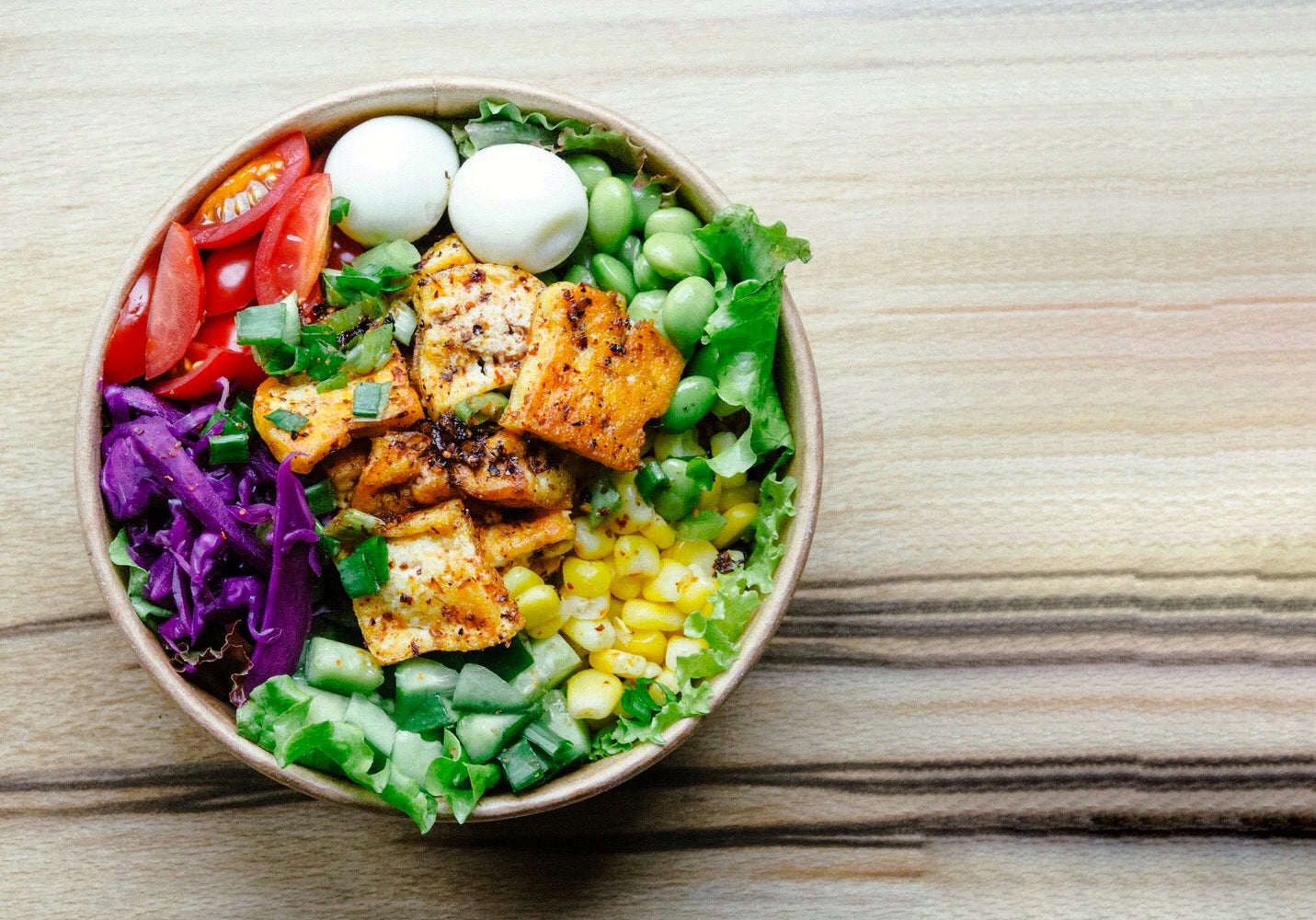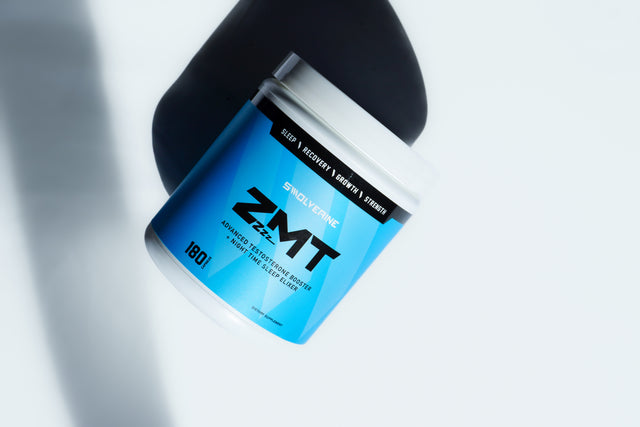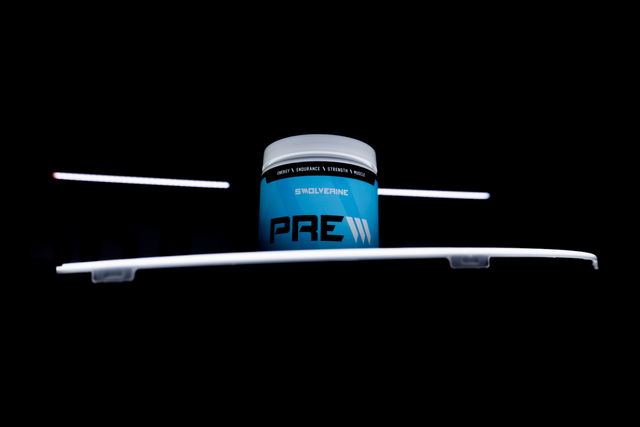There are a lot of stigmas out there in the fitness world surrounding the muscle maintaining and building ability of a plant-based diet. While yes, it’s true that animal proteins deliver all of the essential amino acids in appropriate proportions that the human body can utilize, this doesn’t mean that a plant-based diet cannot provide close to the same benefits. We'll go over the best sources of plant protein to include in your diet and build muscle in depth.
Best Sources Of Plant Protein To Build Muscle
Yes, you can still maintain and build muscle mass on a plant-based diet. Increasing calcium-rich foods (that aren’t dairy of course) while implementing adequate protein throughout the day will set you on the right track. One of the biggest challenges you may face with increasing protein on a plant-based diet is that you’re going to have to eat a bit more than you will with an animal-based diet, especially of our best sources of plant protein.
Comparatively speaking, animal protein sources deliver more essential amino acids per serving and per calorie than plant-based sources, but as you'll learn, incorporating many incomplete proteins can build a foundation of amino acids for your body to use when building muscle.
The essential amino-acid density of plant-based protein sources is a bit lower than animal protein sources. Per calorie, animal sources provide more satiety per calorie which curb appetite, cravings, and leave a fuller feel. On the other hand, as long as you get more than 10% of your calories from protein, maintain a healthy/active lifestyle and eat a wide variety of foods rich in both macro and micronutrients, you should be able to achieve an appropriate amount of protein and branch chain amino acids to support muscular maintenance and development.
Complete Vs Incomplete Proteins: The Best Sources of Plant Protein
You’ve probably heard someone talking about complete or incomplete proteins, but do you know what that means? Including both in your diet contributes to positive overall health and wellness, but how do you know the difference? Finding complete proteins in a vegan or vegetarian lifestyle can be hard because most complete proteins in a single food come from animal products, like meat and fish. Incomplete proteins must be combined with another incomplete protein, to make a complete protein.
Check it out - when you hear someone say complete or incomplete, they’re referring to the kinds of amino acids, the building blocks of muscle, in a given food(s). Plant protein sources do not always contain all of the essential amino acids in the required proportions, making them incomplete proteins. They’re missing, or do not have enough of, one or more of the essential amino acids, causing the protein source to become imbalanced.
Most of the protein sources on this list, while high in protein, are considered to be incomplete protein. Meaning they must be combined with another protein to make it complete.
RELATED ARTICLE Complete Vs. Incomplete Proteins: What's The Difference?
Do Complete And Incomplete Proteins Matter?
Simply put, some proteins are better sources than others. Animo acids and branched chain amino acids perform various, important functions in the human body, like breaking down food, supporting the body’s growth, and repairing tissues.
There are 20 amino acids in total, nine of which are considered “essential” because they are unable to be made by the human body. In other words, they have to be consumed in the diet. As long as you’re eating an adequate balance and amount of incomplete proteins on a regular basis, your body will be able to consume enough amino acids to build muscle and maintain sufficient function of important biological processes.
If you’re looking to build muscle mass, then we recommend eating a robust amount of complete and incomplete proteins from both animal and plant-based sources, but it’s not the end of the world if you don’t eat animal protein. Just know, that the more incomplete protein sources that you include in your diet, the better. The more complete protein sources you include, the better you’re going to build muscle mass. The bottom line? Make sure you’re getting enough amino acids on a daily basis from the best sources of plant protein below
The 15 Best Sources of Plant Protein
Best Sources of Plant Protein - Tofu
Tofu makes an awesome, protein-packed substitute for meat-laden dishes, on it’s own, or for a little post-workout protein punch in your shake. The production of tofu dates far longer than most of us know, all the way into the Western Han period (220-22 BCE) in China! When soybeans are pressurized after being soaked in water, there’s a whitish liquid that comes out called the “milk”. Tofu is traditionally obtained by coagulating the “milk” using nigiri (a natural marine compound), magnesium chloride (extracted from nigiri), calcium sulfate (gypsum), magnesium sulfate (Epsom salts) or acids (lemon juice/vinegar). While tofu has a pretty plain flavor, it’s easily enhanced with spices and sauces as it’s very absorbent.
Tofu is an exception. It is complete, though it's not considered as high-quality as animal sources. Oddly enough, soybeans, from which tofu is made, are considered very high-quality protein; tofu, however, is made from only the curds of soybeans.
Best Sources of Plant Protein - Lentils
Lentils are a great source of plant-based protein, especially for their size. In just 1 cup of lentils, you receive 36% of your recommended daily protein intake. Bet you didn’t know that lentils are considered a legume of the pea family! They’re native to Europe, Asia, and North Africa, and are not often grown in the western hemisphere. They can also be used as a replacement for pasta or starchy carbs. They have a low caloric content, fiber, and protein, keeping you satisfied and full throughout your day.
Mixing small amounts of complete proteins with lentils will provide you with a complete source of amino acids
Best Sources of Plant Protein - Tempeh
Some hail tempeh as a nutritional superhero and we’re right there with them. The history of tempeh dates back more than 2,000 years to Indonesia, where it’s fermentation process takes cracked, cooked soybeans, and turns them into a meat-like consistency, full of protein, dietary fiber, calcium, phytochemical (isoflavones), iron and potassium. While isoflavones are found in other plants, like chickpeas, only soy provides the body with appreciable amounts. In most individuals, tempeh doesn’t cause GI discomfort and indigestion like some other variations of plant-based protein do, like vegan protein powder supplements, for example.
While beans are generally low in the amino acid methionine, soy is a complete protein and thoroughly deserves its status as the go-to substitute for the meat-free. Tempeh and natto are made by fermenting the beans and provide ~18 grams of protein per 1 cup serving.
Best Sources of Plant Protein - Edamame
Fresh soybeans, or edamame, are also called "beans on the branch" in Japanese. While you may have had it as an appetizer at a Japanese restaurant, this isn't the only way you can eat it. Edamame makes a wonderful snack and can be found frozen in many every-day supermarkets in the western world. They're a great source of soy as well as isoflavones, an anticancer phytochemical compound.
Soy is one of the few plant sources of complete protein, meaning it contains all nine of the essential amino acids. Edamame, or cooked soybeans, has 17 grams of protein per cup.

Best Sources of Plant Protein - Pinto Beans
Beans are unique foods in that they’re the more mature forms of legumes. Dried pinto beans are a cheap alternative to meat as a plant-based protein. They come dried in prepackaged containers or bulk bins as well as in the isles as canned and bagged, dried beans, in the supermarket. Jackson Pollack thought that pinto beans looked like little painted canvases, hence the name “pinto” which in Spanish translates to “painted”. When cooked, you’ll notice that the splotches of color disappear, turning them a beautiful light pink color. Fun fact: pinto beans contain 285% of your daily recommended intake per 1 cup of beans (245 calories) of molybdenum. Molybdenum is an essential mineral that activates enzymes in the body to help break down harmful sulfites and prevent toxins from building up in the body.
To make the protein that you receive from pinto beans complete, you'll need to ensure that your diet includes rich sources of the amino acids that pinto beans lack. We recommend pairing pinto beans with grains, like rice or seeds, to make a complete protein.
Best Sources of Plant Protein - Black Beans
Black beans are unique in that over 70% of the calories in black beans come from carbs, specifically, resistance starch. The majority of black beans are not easily digested and are actually passed through the upper GI without being broken down. The high level of starch isn’t converted into simple sugars, avoiding the sharp rise in blood sugar levels, triggering an insulin response. Thus, black beans are very low on the glycemic index, broken down by bacteria in the large intestine, and provides our bodies a sufficient amount of protein and phytonutrients (specifically, anthocyanins: delphinidin, petunidin, and malvidin). These anthocyanins are responsible for turning the bean their unique black color.
If you eat a dish with black beans, you're not getting a complete protein. But when you combine any two beans, or beans with a grain, nut, or seed, it turns the incomplete protein into a complete protein.
Best Sources of Plant Protein - Hemp Seeds
Hemp seeds are more than 30% fat, specifically linoleic acid (omega-6), alpha-linolenic acid (omega-3), and gamma-linolenic acid. With more than 25% of the total calories coming from protein, this is considerably more than other seeds, like chia or flax, whose calories are 16-18% protein. If you’re considering adding hemp seeds to your plant-based protein intake, we recommend about 2-3 tablespoons to get around 11g of protein.
Hemp seeds are considered a complete protein source, which means that they provide all the essential amino acids. If you’re considering adding hemp seeds to your plant-based protein intake, we recommend about 2-3 tablespoons to get around 10g of protein.
Best Sources of Plant Protein - Pumpkin Seeds
But buyer beware, if you eat too many pumpkin seeds you may grow a giant pumpkin patch in your tummy! Ok, ok, we’re kidding, but if you do eat too many, you may experience a bit of GI discomfort, like gas and bloating due to the high amount of dietary fiber. Pumpkin seeds are high in calories, fat, and protein, making it a great addition to salads, shakes, or alone as a snack. Did we mention they’re a good source of the mineral zinc?
Pumpkin seeds are a complete protein, containing all nine of the essential amino acids your body needs. Eating just 1/4 cup of pumpkin seeds will provide you with half of the magnesium you need for the day.
Best Sources of Plant Protein - Peas
With their sweet taste and starchy texture, green peas contain a unique assortment of phytonutrients, delivering the body a rich amount of antioxidant and anti-inflammatory benefits. They’re a stand out environmentally friendly plant-based protein food because the plant gives back to the soil as it takes from it, duped a “nitrogen-fixing” crop. This reduces the need for fertilizers or pesticides, which we all know aren’t good to consume. Green peas are low in fat (only 1/3g fat per 1 cup), boast about 30mg of alpha-linolenic acid (ALA), beta-carotene and vitamin E.
Peas are legumes, like lentils and chickpeas, and they're a standout source of protein. Pea protein comes from yellow split peas, and unlike some other plant proteins, such as rice or beans, it's a complete protein, containing all nine essential amino acids.
Best Sources of Plant Protein - Quinoa
Quinoa, pronounced “keen-wha”, is an ancient grain that provides not only a sufficient amount of protein for plant-based diets but a host of other nutrients and health benefits. It’s a great gluten-free option, rich in dietary fiber, antioxidants, manganese, iron, lysine, vitamin B2, and magnesium! It has a naturally bitter coating called saponin, but you can remove this by rinsing the quinoa with water before cooking/eating it. Given, most pre-packaged quinoa options have the saponin removed, we still suggest rinsing it just to be safe. Quinoa is a great protein and grain to include as a side, in salads, for tacos, and even by itself as a pasta-alternative, for summer backyard bbq nights, like tabouleh!
Quinoa is a complete protein containing all nine essential amino acids to make it one of the best sources of plant protein to include in your diet and build muscle. Just 1 cup of this whole grain contains ~8g protein.
Best Sources of Plant Protein - Whole Wheat Spaghetti
Pasta made from whole grains is lower in both calories and carbs while boasting a higher fiber and micronutrient content, as compared to many of its white pasta counterparts. While whole wheat spaghetti might run you a little more at the store price wise, we say it’s worth it. The food contains all three essential parts of the whole grain kernel: the bran, germ, and the endosperm, giving it a robust nutritional profile that traditional pasta severely lacks. Better yet, you’ll have better appetite control and be satisfied longer because the fiber takes longer to digest in the GI. Comparatively speaking, whole wheat spaghetti makes this list of the best sources of plant protein to include in your diet because it boasts about 16% of your daily protein recommendations, as compared to white pasta, where the endosperm is removed taking about 25% of the grain’s protein content with it.
Whole Wheat Spaghetti on its own is a pretty good source of protein. Unfortunately, it is not a complete source of protein as it doesn’t include enough essential amino acids. To make it a complete protein we recommend combining it with another incomplete or complete protein on this list to fill out that essential amino acid profile.
Best Sources of Plant Protein - Almonds
Almonds are packed with nutrients like biotin, vitamin E, copper, manganese, and vitamin B2, on top of packing a punch in the way of protein and fat content, landing them a spot on this list of the best sources of plant protein. They’re a heart-healthy snack that improves blood LDL and raises blood HDL. Native to the Mediterranean climate regions of the Middle East, almonds are harvested as edible seeds. While they can be eaten raw, cooked, blanched, or milked, having these little guys on hand as a snack or addition to a meal is a smart thing to do.
While they’re close, almonds are not a complete protein source. They don’t contain enough lysine or methionine and cysteine needed to turn it from an incomplete protein to a complete protein. One cup of almonds provides about 6g of protein and a host of other nutrients.

Best Sources of Plant Protein - Spinach
Spinach is quite the versatile leafy green because it’s rich in water-soluble vitamins, minerals, fat-soluble vitamins, phytonutrients, and even protein. Whether you sauté it (we recommend buying frozen spinach for this, more bang for the buck), having it in a salad, on a sandwich, or in a post-workout shake, you’re going to get a ton of benefit that spans past just protein. Raw is the best way to consume spinach if you want the maximum nutrient benefit. Chlorophyll is responsible for giving the plant its unique green color, which in the human body, have been shown to delay stomach emptying, decreased hunger levels, and prolonged satiety so you stay fuller, longer.
The protein found in spinach is an incomplete source of protein, meaning it does not contain all nine essential amino acids. To make spinach a complete protein we recommend combining it with legumes and whole grains.

Best Sources of Plant Protein - Brussels Sprouts
The world is split into two categories: those who like brussels sprouts and those who can't stand them. There isn't much in between on this one. But did you know, brussels sprouts are actually a type of cabbage? This tasty plant protein came to fruition after the beginning of the 18th century in northern Europe, near Brussels, in order to get the maximum benefit from the arable land in the area. Brussels contain more than just protein though; this cruciferous vegetable contains 237mg per 100g serving of glucosinolates, a natural sulfur-containing phytochemical, which is responsible for the distinctive odor, bitter flavor, and it's anticancer properties.
Unlike most vegetables, Brussels sprouts are rather high in protein, accounting for more than a quarter of their calories. Although the protein is incomplete, it doesn't provide the full spectrum of essential amino acids. It can be made complete with whole grains.

Bridging The Gaps In a Plant-Based Diet
Getting enough protein in on a plant-based diet can be hard, even if you're getting enough of the nutrients we listed above. Our best suggestion? Combine the two; real food and high-quality vitamins and minerals from nutritional supplements.
If your diet isn’t planned properly and it doesn’t include a wide variety and robust amount of nutrients, you may be falling steeply short of your nutrient goals, keeping you from building muscle and preventing injury. To bridge the gaps in your plant-based diet, we recommend taking a micronutrient approach to your macronutrients. Meaning supplementing with vitamins, minerals, and nutrients to keep your baseline functioning at a high level and keeping your cells happy while you’re at it, fueling positive biological functions to support your active lifestyle.
Looking for the best plant-based protein to build more muscle, shred body fat, and improve athletic performance?


















